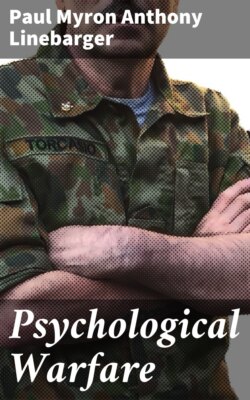Читать книгу Psychological Warfare - Paul Myron Anthony Linebarger - Страница 38
На сайте Литреса книга снята с продажи.
CHAPTER 5
Psychological Warfare in World War I
ОглавлениеTable of Contents
World War I saw psychological warfare transformed from an incidental to a major military instrument, and later it was even called the weapon which won the war. The story spread, since the Germans liked to imagine that they had been talked out of winning, and since ex-propagandists among the Allies enjoyed thinking that their own cleverness had been decisive when even the tremendous violence of trench warfare had produced nothing more than a stalemate. If psychological warfare is considered in the broad sense, it seems plain that it was among the decisive weapons of 1914–1918. The political decency of the Allies, the appeal of President Wilson's Fourteen Points, the patent obsolescence of the Kaiser and what he stood for, the resurgence of Polish, Baltic, Finnish, Czechoslovak and South Slav nationalisms—all these played a real part in making Germany surrender in 1918. More real than the role of guns, men, ships, planes, tanks? This cannot be answered: it is like asking of a long-distance runner whether his heart, lungs, legs, or head contributed most to his success. Since war is waged by and against all parts of the human personality—physical condition, skills, intelligence, emotions, and so on—it is impossible to distinguish between the performance of one kind of weapon and the other in the attainment of a goal itself complex—governmental surrender. Only a weapon which left no enemy survivors could claim for itself undisputed primacy in victory.
Propaganda came to prominence in war because the nations involved had made mass-communications part of their civilian lives. The appearance of huge newspapers, systematic advertising, calculated political publicity, and opinion manipulation in other forms made it inevitable that skills which developed in civilian life should be transferred to the military. In general, the psychological warfare efforts of each belligerent were the direct equivalent of his peacetime nonpolitical propaganda facilities. (By way of exception, the peculiar genius of the Bolshevik leaders stimulated a propaganda effort disproportionate to the facilities, either of personnel or matériel, to be found in pre-1914 Russia.)
Nations rarely change their basic character in time of war. When war starts it is usually too late to re-educate generations already grown up, teach them wholly new skills, or develop administrative or operational procedures unknown in peacetime life. Sometimes, by great effort, a nation can transform a small available cadre into large, new and effective units on the political, military, economic or social fronts. Even then, the character of the war effort will be colored and influenced by the experience of the men undertaking it. The British had, in 1914, one of the world's finest news systems, a highly sophisticated press, and extensive experience in international communication for technical and commercial purposes, notably the undersea cable system, and they turned these to war use with considerable smoothness. The Germans had a far more regimented press and a more limited network of commercial and technical connections. The British, furthermore, had a diplomatic and consular service of superb quality; comparable German services included a much higher proportion of bunglers and enthusiasts.
From the very beginning the British had the lead. They nailed German propaganda as propaganda, while circulating their own as news, cultural relations, or literature. The Germans who boasted that they were a "cultured" people had their naïveté rewarded when the British let the German word Kultur become a synonym for boorish pedantic arrogance. The Germans had the awful habit of putting many of their own unattractive emotions into words, and the even more ruinous habit of then printing the words. In many instances, the British simply let the Germans think up braggadocio or vengeful phrases, then circulated the German phrases to the world. The English language was permanently enriched by some of these: strafe comes from the German plea that God "strafe" (punish) England. The actual "Hymn of Hate" was originally a song made up by Germans for Germans. The word "Hun" was applied to the German Army by Kaiser Wilhelm himself, and so on. Furthermore, the Germans created in their press and information services a condition of bureaucratic snafu which has rarely been excelled in any war. National character certainly worked out its automatic vengeances in World War I.
The American psychological warfare effort of 1917–1919 also drew heavily on familiar skills: the American press, second only to that of the British at the time; the church, Y.M.C.A., and Chautauqua groups; and the wealth of private clubs which flourish under our liberal system of laws and usages. Other nationalities made efforts similarly in keeping with their peacetime facilities. The Japanese were adroit, but even at that time confused by the mix-up of trying to be a "civilized" power but simultaneously expansionist. The French showed high professional skill in adapting their military and diplomatic personnel to propaganda tasks. France's position as battleground ensured her of the rage of her own people and the sympathy of neutrals, giving propaganda from Paris a hearing. The Chinese, though undergoing the downfall of the Yüan Shih-k'ai dictatorship and lapsing into chaos, maintained an impeccable diplomatic front and played a weak hand for everything it was worth; they had their private quasi-war with the Japanese in 1915. That they did so while putting the blame for Allied disunity squarely on the Japanese where it belonged is to their credit.
The weight of the propaganda war, as of the material war, fell on its prime contestants, Britain, Germany, and the United States. The private and revolutionary groups which emerged as the revolutionary governments played a vigorous part because they had few other functions to distract their attention. The Republic of Czechoslovakia got its start in Pittsburgh, Pennsylvania, in 1918, and fought psychological warfare from the instant it took form; not till later did it assume the weightier and more expensive responsibilities of ruling and warring.
